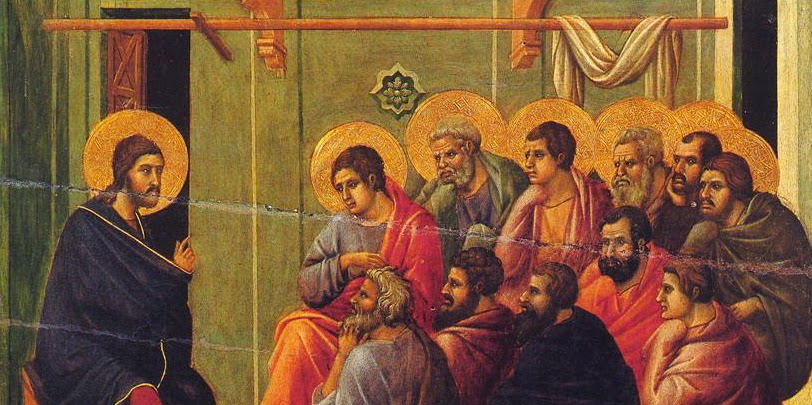I
was quite touched when Fr. Tom asked
if
he could wash my feet on Holy Thursday—
the
first time, I think, in my priesthood
since,
more often than not,
I’m
the one on my knees doing the washing.
After
we’d taken our places in front of the church
and
removed our shoes and socks,
the
parishioner sitting next to me scanned the room and said,
“The
view is rather different from up here.”
His
comment has stayed with me the last few weeks.
I
couldn’t agree more!
Have
you ever tried to point out something at a distance—
a
building, a mountain peak, a star—
only
to have the other person say
they
can’t see what you’re talking about?
More
often than not,
the
problem is that you’re not looking from the same spot.
Even
if only slightly,
you’re
seeing things from a different angle,
a
different perspective, a different point of view.
On
this “Good Shepherd Sunday,”
I
think it’s helpful for both you and I to remember
that
shepherd and flock stand in different places—
we
each take in a different view.
Let
me start with a concrete example.
Most
every member of this congregation
will
see one priest at one altar in one church this weekend.
But
I’ll see between 700 and 800 parishioners
at
four Masses in two churches before noon today.
Multiply
that by every baptism and wedding,
every
anointing and funeral,
every
check signed and meeting attended,
every
word of counseling given and complaint received,
and
I think you can begin to understand what I mean.
From
where your priests—and in particular, your pastor—sits,
there’s
a rather different view of life in our parishes
than
the one you can get in the pews.
And
this difference of perspective allows your priests
to
see a wider angle, to take in a bigger picture.
Try
as we might to point things out,
we don’t
always succeed in helping you to see what we see.
Nonetheless,
this Sunday, I’m going to try again.
From
where I sit, I think we need
to
make some pretty significant changes around here.
that
our four parishes would be merging into one,
I
assured you that most things—
in
particular, Mass schedules and use of our church buildings—
would
remain unchanged, at least at the beginning,
as
we transition into the new St. André Bessette Parish.
I
sincerely meant what I said at that time.
But
with the passage of another year,
I’m
afraid the “beginning” may be shorter
than
originally anticipated.
I
know that some of you are seeing it, too.
At
our brainstorming session not quite two weeks ago,
several
folks raised concerns about our Mass times—
in
particular, that they don’t fit for many working people and families.
Of
course, some of the same people were quick to add,
“…but
don’t touch my Mass.”
Other
parishioners suggested
that
we consider closing some of our churches,
at
least during the winter heating season.
(I’ve
heard this idea circulating around town in recent months,
and
even received an anonymous note about it in the collection.
By
the way: that’s not the most effective way to communicate.)
I’ll
admit: I’ve thought some of these same things,
but
not so much for reasons of job and sport schedules or fuel economy.
For
one thing, seeing what I see from where I stand,
I
don’t think we’re living up to our potential as a parish flock.
We’re
focused more on protecting what’s within
than
on reaching out to the wider community.
Our
energy and efforts have been directed
toward
matters of maintenance—
of
looking back and hanging on to the way things were—
instead
of toward matters of mission—
of
moving forward and making sure
we’re
where God wants us to be today.
And
another thing: your shepherds are tired—
exhausted,
actually.
We’ve
often joked in the rectory
that
we must have the youngest rectory in the country—
possibly
the world!
And
even we are hitting the wall.
It’s
not good for us or for you that, on Sundays,
we’re
always running in at the very last minute
and
running back out as soon as it’s over
because
of the tight schedule of so many Masses.
It
breaks my heart every time someone comes up to me
and
says, “Sorry to bother you, Father…
I
know you’re so busy, Father…”
You
shouldn’t have to apologize
because you want to talk to your priests!
We
can’t keep doing things the way we have been;
it’s
simply not sustainable.
Jesus
didn’t suffer that we might just scrape by;
he
died that we might have life, and have it more abundantly.
We’ve
been scraping by for long enough.
I
don’t have any specific plan to announce to you right now.
We’re
not going to rush into anything.
I
will continue to work closely with Bishop LaValley,
our
parish staff, and Pastoral Council.
And
I’m going to have to ask you to trust me;
no
longer a stranger after four years here,
I
hope that at least a few of you already do.
We’ll
need to take a few chances—
as
Pope Francis likes to say, “make a mess.”
We’ll
probably fail a few times.
I
know that I won’t make everybody happy—
but
I don’t really think that’s my job,
and
besides, not everybody’s happy now
and
some folks simply never will be.
As
I’ve said to you before: there’s no standing still;
we’re
either sliding back or moving ahead.
On
the U.S. calendar, this Sunday, of course, is Mothers Day.
 And
on the Catholic calendar, this “Good Shepherd Sunday”
And
on the Catholic calendar, this “Good Shepherd Sunday”
is
the 51st World Day of Prayer for Vocations.
A
neat story makes it clear just how well
these
two celebrations fit together.
Pope
St. Pius X died just 100 years ago.
His
family was so poor that his mother
worked
as a washerwoman and a school janitor
in
order to raise enough money to put him though the seminary.
When
he was elected pope, he was a bit uncomfortable
with
all the pomp and circumstance of the office.
“Look
how they’ve dressed me!” he said to a friend.
 His
mother was present
His
mother was present
on
the day of his coronation (as it was known then),
and
kissed his large papal ring, as was the custom.
But
she then presented her tiny hand with her simple wedding ring
and
said, “Now kiss my ring—
for
without it, you never would have received yours!”
When
we think or talk about vocations,
we
often focus on the differences between them.
That
can lead us to think that the roles
of
clergy and laity, of shepherds and sheep,
are
somehow at odds
when,
in fact, they’re meant to compliment each other.
In
a book I’m now reading, a clever French priest jokes
that
priestly celibacy and the Sacrament of Matrimony
are
actually very much alike:
in
celibacy, a man renounces all women,
while
in marriage a man renounces all women but one! (cf. J. Philippe)
All
kidding aside…
Whether
you’re single or married, divorced or widowed,
a
mother or a father, ordained or in religious vows,
we’re
all called to live the same mystery:
the
mystery of Christ and of his Cross.
Although
expressed in different ways,
it’s
all about generous self-giving, about sacrificial love,
about
laying down one’s life for another,
about
giving flesh again to the love of God
revealed
for us in Jesus, his Son.
Precisely
because we stand in different places
and,
therefore, take in rather different views,
we
need one another.
The
shepherd needs his sheep;
in
fact, he’s no shepherd at all without them.
And
if his sheep are intent, each one,
on going its own way
rather
than looking to the good of the flock,
he’ll
be left rather weary and discouraged—
an
unhealthy situation for all involved.
Likewise,
the sheep need their shepherd—
to
keep them together, to guide and protect them.
But
if the shepherd is merely concerned
about
his own comfort and gain,
or
if he lacks the courage to correct or direct when needed,
or
if he’s basically run ragged,
then
the good of the whole flock is put at risk.
We
must learn from one another.
We
must support and encourage one another.
We
must love one another.
Trust
me: the view is rather different from
up here!
And,
please, trust me as I try to be a pastor—your pastor—
after
the heart and mind of the Good Shepherd,
leading
us into a new and more abundant life.
 chatting about this and that
chatting about this and that 





























